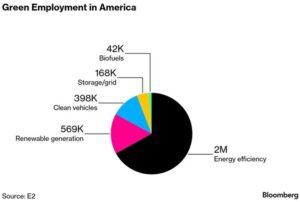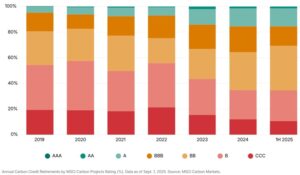Efficiency heads employment stats, credibility gap increasing and risks underestimated
In this issue:
Efficiency leads employment surge in US
Energy efficiency is far and away the biggest category of US clean energy employment according to a US study of trends by E2. The clean energy sector added around 100,000 jobs to the US economy in 2024, growing at a rate three times greater than the general economy. The clean energy sector made up 82% of all new energy jobs and now makes up 42% of the total. Efficiency roles make up 63% of clean energy jobs. However, the picture is flipping dramatically in 2025, according to the report, following the reversal of the previous administration’s IRA and the blockade at every turn introduced under the new administration.
Corporates fight back
Meanwhile, as the US government seems intent on destroying its clean energy sector, at least its corporates are resisting. The latest report from Net Zero Tracker tells us the number of large, listed corporates in the US with net zero targets has increased 9% since last year. While the percentage of global GDP covered by commitments at the national level has dropped from 93% to 77% on the back of the US’s withdrawal from the Paris Agreement, it seems regional, city and corporate commitments are at least holding up and, in most cases, increasing. The number of cities with net zero commitments increased 24% and the increase among regional governments was 16%.
Scepticism and credibility gap on the increase
The need for integrity in emissions reporting becoming is increasingly important. 62% of consumers believe organisations are guilty of greenwashing, according to the latest A World in Balance report from Cap Gemini. That’s up from 52% in 2024 and 33% in 2023, indicating a rapidly increasing credibility gap. 77% of consumers believe organisations should be doing more to address their emissions.
Increasing focus on quality
A new report from MSCI confirms the anecdotally known trend of a shift to an increased focus on quality and integrity in carbon markets. The report reveals attention to integrity is on the increase on the back of concerns of perceived greenwashing. The distribution of retirements, by assessed integrity, shows a clear trend to quality.
Fossil fuel plans fly in the face of climate pledges
A new analysis of the published plans for fossil fuel production of the 20 largest producing countries, which represent around 80% of global production, reveals production rates are expected to be more than double the level needed to restrict warming to 1.5C and more than 77% above the amounts needed to restrict to a 2C increase. The 2025 Production Gap Report, from an international team of over 50 scientists, shows the gap increasing from 110% in 2023 to 120% in 2025. 17 of the 20 countries are still planning to increase production of at least one fossil fuel to 2030 and 11 have seen production plans for at least one fuel increase since 2023.
Corporate risk managers underestimating climate impacts
The scale of physical, climate-related risks appears to be escaping many corporate risk managers. Commercial property insurer FM has published a survey of 800 risk decision-makers and compared results with responses from 150 insurance brokers. The results show that while the risk managers think they are preparing for climate-related events, they could well be behind the game. For example, 95% of decision-makers believe they are mostly or fully aware of their exposures while only 67% of the brokers believe their clients are in that position. Meanwhile, 74% of risk managers are believed to be underestimating their wind and flood exposure and only 28% say their organisations have fully embedded risk engineering in the design and construction of new sites, despite brokers ranking this as the most effective mitigation measure.
Did you know ……
While President Trump was declaring climate change “the greatest con job ever perpetrated”, 35 former presidents and prime ministers, plus three other dignitaries including former leaders of the UN and OECD, were publishing an open letter calling for a regime to tax the profits of fossil fuel companies and use the proceeds to support climate change mitigation.


